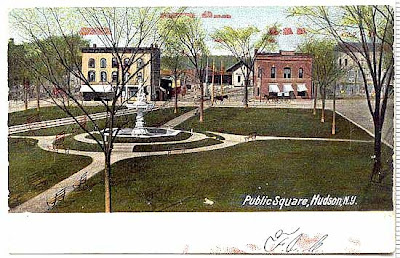Restoring Seventh Street Park, originally known as the Public Square, is an idea whose time has come, but it won't be the first time citizens of Hudson have taken it upon themselves to improve this open space. Anna Bradbury in her History of the City of Hudson, New York tells about the effort in 1878 to beautify the park then known as the Public Square.
[The Public Square] as we have seen was intended for a public park by the donor, but for some inscrutable reason it was denuded of its fine old forest trees, and paved with cobblestones. To complete the devastation, the Hudson and Berkshire Railroad was allowed to cross it, and thus it remained until 1878, when the matter was taken up by a resident on the upper side of the Square. Subscriptions were solicited and a sufficient sum was raised, together with the gifts of the coping and trees from individuals, to transform the treeless desert into a refreshing little oasis. The Boston and Albany Railroad Company atoned in a measure for its presence, by generously furnishing sufficient gravel to fill in the whole surface of the Park.These picture post cards show what the park looked like after these 1878 improvements.




I still wonder what the basis is for saying that the name of this spot is "The Public Square." All I have seen are postcards like the above, and other generic references. These look to me like descriptive captions and labels, not an official name... Much like one might find a picture of an old courthouse labeled "Smithville Courthouse," though it might actually be called "The Abraham Lincoln Courthouse" or somesuch.
ReplyDeleteIt may well be that in the absence of any official proclamation, people referred to it in an ad hoc manner as "the public square." But again, that seems quite different than asserting it as a formal name...
I notice for example that in the excerpt above, Bradbury refers to it once as "the Square," and in the other instance the author of this blog post has inserted that name between [brackets], indicating an editorial change.
Is there some more authoritative reference than the above material?
--S.
Hopefully the fountain top is still being stored somewhere in town !
ReplyDeleteLast time I saw it was several years ago in the back of a Warren Street garage.
Columbia County History&Heritage cchsny.org/CCHH_603_setup.pdf
ReplyDeleteVolume 2 Number One Summer 2003
on pg 18 is a b/w photo similar to postcards , it called Park Square ,Warren St., late 19th century ;the statue of Venus and the fountain.....
On pg 22 What Ever Happened to Venus? BY Pat Fenoff is very interesting
As she is the Hudson and DAR Historian, need permission to reprint her article,but poor Venus goes through alot.
Last fall Sarah Sterling mentioned it as, the "Park" was on her list of improvements she was interested in ..Especially as of late it has been commonly referred to as" Needle Park."Venus is supposedly in the DPW garage down by the sewage plant.DPW to scale Map predating 1970's Rotary Club revamping,calls it PUBLIC SQUARE.I hope the cobblestones were still underneath the original sidewalks
and Venus will materialize
The park looked better then than it does today.
ReplyDeleteJock Spivy
I have a City of Hudson map from 1873 which lists it as "Public Square." If that helps.
ReplyDeleteTwo selections from Millers Historical Sketches of Hudson, which might be relevant;
ReplyDeletehttp://books.google.com/books?id=QrEPAAAAYAAJ&pg=PA15&img=1&zoom=3&hl=en&sig=ACfU3U3YAWemoaQ6Kjdo1zq_qagJCIPc4w&ci=98%2C1006%2C730%2C241&edge=0
Ezekiel Gilbert is the gentleman in question here, http://books.google.com/books?id=QrEPAAAAYAAJ&pg=PA18&img=1&zoom=3&hl=en&sig=ACfU3U2Nj8VvmIkVVtxBjm3atHXfseSzKg&ci=184%2C283%2C720%2C267&edge=0
From Millers account, in addition to Public Square, there was Jail Square, Market Square, and Franklin Square.
Thanks for those links, Dave, et al.
ReplyDeleteI just don't find citations such as the 1873 map very conclusive, because per my original post "Public Square" easily could be a descriptive label rather than a name. (For example, if one found an old map which labeled Underhill Pond as "Public Pond" or "Swimming Hole" one would not automatically assume that was its formal name.) Consider, for example, that Prison Alley's post above cites another postcard which refers to it as "Park Square," which again could be more descriptive than proof of a name.
One common-sense theory might be that the park never got officially given a name, so various competing ad hoc names—Public Square, Park Square, etc.—sprung up, since people needed to call it something when giving directions, etc.
Today, the descriptive name I hear most often is "7th Street Park," distinguishing it from the Courthouse and Waterfront parks.